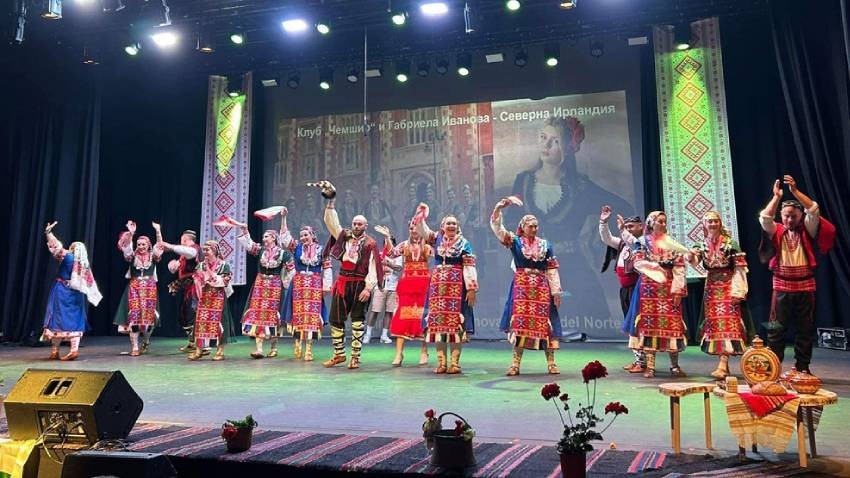There are no data regarding the exact number of Bulgarian dance ensembles operating abroad. But there is one thing that is certain – they are amateur groups scattered across all continents, acting as a bridge between Bulgaria and the rest of the world. Dr. Julia Pocheva from the Bulgarian Academy of Sciences’ Institute of Ethnology and Folklore Studies has been making a study of amateur folklore ensembles inside and outside Bulgaria as part of a project connected with the dimensions of our national and European identity. She reaches the conclusion that these activities have developed as hubs of social and cultural communication abroad. “People get together in these dance groups who would otherwise never meet, and that builds the kind of environment where friendships are forged, as well as a sense of community, of mutual assistance, of celebrating and living together,” Julia Popcheva says. “They become the motor and the vehicle of Bulgarian culture in other countries where they present it to the local community. For example, during the so-called Culture Days Bulgarian stands are put up presenting Bulgarian cuisine, flyers with information about the country, various objects from the traditional lifestyle, as well as our folk dances, national costumes and songs, everything the group or association in question possesses which can give an idea of the country.”
Very often, these dance groups have to undergo a legitimation process with the local authorities, and to this aim they register their own associations which become the core of community life for Bulgarians living abroad. 
“For example, in Bordeaux, France, where I spent 6 months, the dance ensemble is represented by the only association of Bulgarians in the city,” Julia Popcheva says further. “So, together with several other enthusiasts, the group has become a nucleus bringing the local Bulgarian community together. And that is a very important thing, because in Bordeaux there is no Bulgarian school, unlike some of the other major cities where there are compact Bulgarian diasporas. There is no Bulgarian church either, so the association is the only place our compatriots can actually meet.”
The dance groups of the Bulgarians living in other countries have their own social network, Julia Popcheva says. Every year they get together at the travelling festival called In the Town Square of the Other Bulgaria. 
This year’s festival was in May in Palma de Mallorca. The festival has been helpful in another way – an Association of Bulgarian Folk Ensembles Abroad was set up a while ago.
Moreover, there is an entire market connected with folklore festivals in Europe. The groups commission clothes, props, music, teaching aids from Bulgaria. Professional choreographers from the country frequently train these ensembles in the respective country. “So the bond between Bulgaria and these groups is very much alive,” says Julia Popcheva. 
“Besides the dance groups, some of them have choirs, and some have Sunday schools. There are even countries where there are mixed associations – for example, the Bulgarian-Spanish association which helps Bulgarians who have emigrated to Spain, but also organizes events to acquaint the local community with Bulgaria, including by trying to organize trips to Bulgaria for the locals. There is a mix of all of these activities in an endevour to position Bulgaria within the EU on an equal footing,” says in conclusion Dr. Julia Popcheva.
More:
Interview by Yana Boyanova for BNR’s Europe-New Generation
Compiled by Veneta Nikolova
Photos: Association of Bulgarian Folk Ensembles Abroad, Bulgarian Association, Northern Ireland, Institute of Ethnology and Folklore Studies - Bulgarian Academy of Sciences, Facebook/ Bulgarian folklore club Chemshir in Armagh, Northern Ireland
For the fourth year in a row, the town of Tran in Western Bulgaria will host a winter festival of masquerade games. The beginning will be set on February 3 from 12:00 to 14:00 in the central town square. Four survakari groups from Zemen, Trun and the..
On February 2, according to the Bulgarian folk calendar, it is Petlyovden (Rooster Day) - a day dedicated to the health and fertility of male offspring. It is most widely popular in Eastern Bulgaria. One of the obligatory elements is the..
Wine will spout from two drinking fountains over the weekend in Delchevo. Perched on top of the mountain, the village located close to Gotse Delchev, has made a name for itself as a tourist attraction with its ancient architecture and the beautiful..
Eight authentic Bulgarian traditions and skills, passed down through generations, have been added to the National Representative List of Bulgarian..

+359 2 9336 661
